Objects of Power: Somto Ajuluchukwu Reimagines Sacred African Artifacts as Speculative Tech
5 days ago



Dark Mode
Turn on the Lights

Over the last couple of years, Art X has set itself apart as the most prominent art fair around. Looking ahead to its fifth edition, it has been announced that the showcase will run from December 2nd to December 9th. Find below, 10 artists whose work will be showcased this year. Evans Mbugua| OOA Gallery […]

Over the last couple of years, Art X has set itself apart as the most prominent art fair around. Looking ahead to its fifth edition, it has been announced that the showcase will run from December 2nd to December 9th.
Find below, 10 artists whose work will be showcased this year.

Don’t Slow Me Down If I’m Going Too Fast by Evans Mbugua – presented by OOA Gallery
Evans Mbugua studied graphic design at the University of Toulouse Midi-Pyrénées and this grounding is evident in his portraits; vibrant compositions with pictogram-patterned backdrops that represent the urban environments that shape our daily lives.
Working in oil paint on Plexiglas, Mbugua composes his works from a series of dots, creating layers that, in the finished works, result in shapes coming in and out of focus as the viewer moves towards or away from a piece. The series devoted to “Body Talk” finds its inspiration in the universal language of dance — which allows the transmission of expressions of joy, peace, excitement, tension, weight, space, rhythm, and flexibility — and seeks to render the dynamism of Africa on the move.
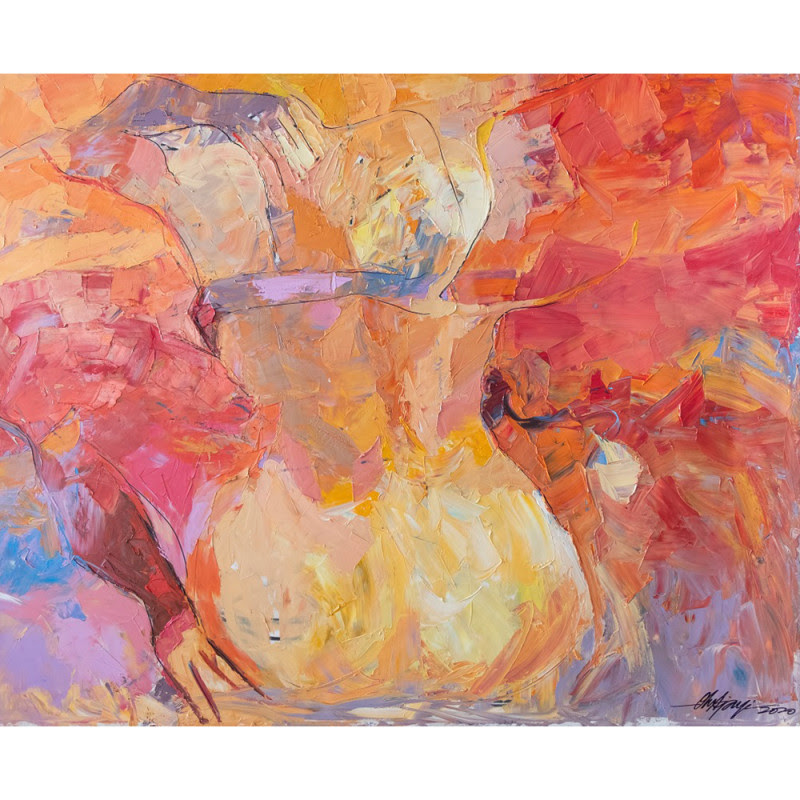
Six Pillows by Olu Ajayi, presented by Bloom Art Lagos.
Olu Ajayi is one of Nigeria’s most versatile and consistent artists of his generation. His experience as a portraitist, realist, experimentalist, and cartoonist has him constantly renewing ideas and merging African traditional skills with modern aesthetics.
Drawing his influence from the famous Auchi colorist school, Ajayi’s sensuous colors, sweeping strokes, and narrative content place the human figure on a grand scale, while the dramatic cropping of figures and forms emphasizes the immediacy of paint. Ajayi has also achieved recognition for his remarkable watercolors in greyscale executed in a broad gestural technique.
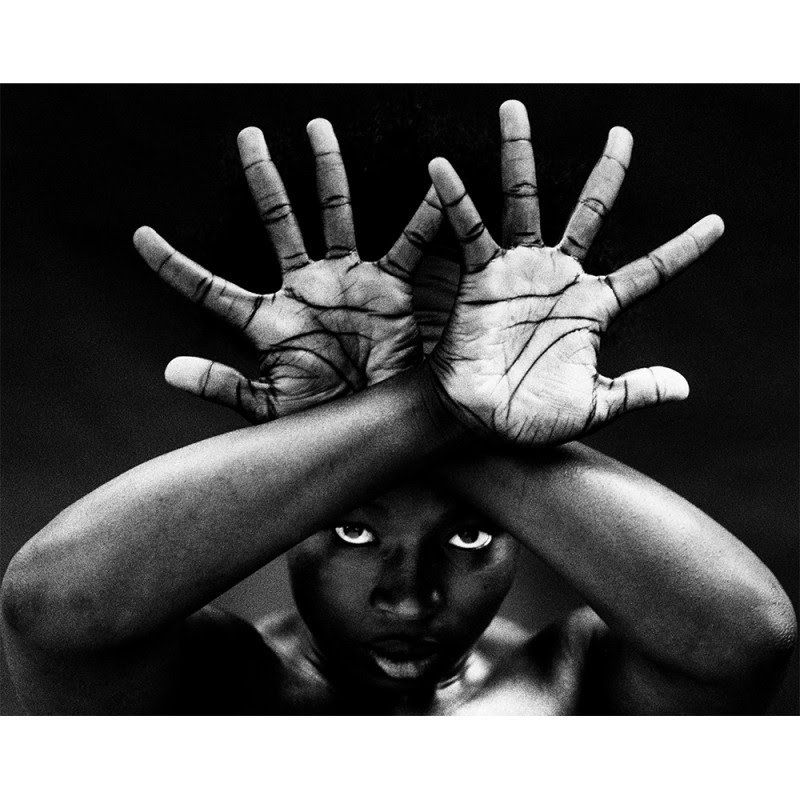
Noir 43 by Angèle Etoundi Essamba presented by SMO Contemporary Art
Angèle Etoundi Essamba’s work lies at the intersection of social and gender issues in art, with her main subject being the identity of the African woman. Essamba’s series ‘Noir’ features intimate B&W portraits with dense shadows and backgrounds that blend together and dominate the frame to the extent that her subjects are only partially revealed, hinting at the relationship between their interior and exterior selves while also conveying strength and beauty.
Essamba’s works have been widely exhibited in museums and galleries in Europe and Africa. In 2016, she was awarded the Order of Valor by the President of Cameroon.
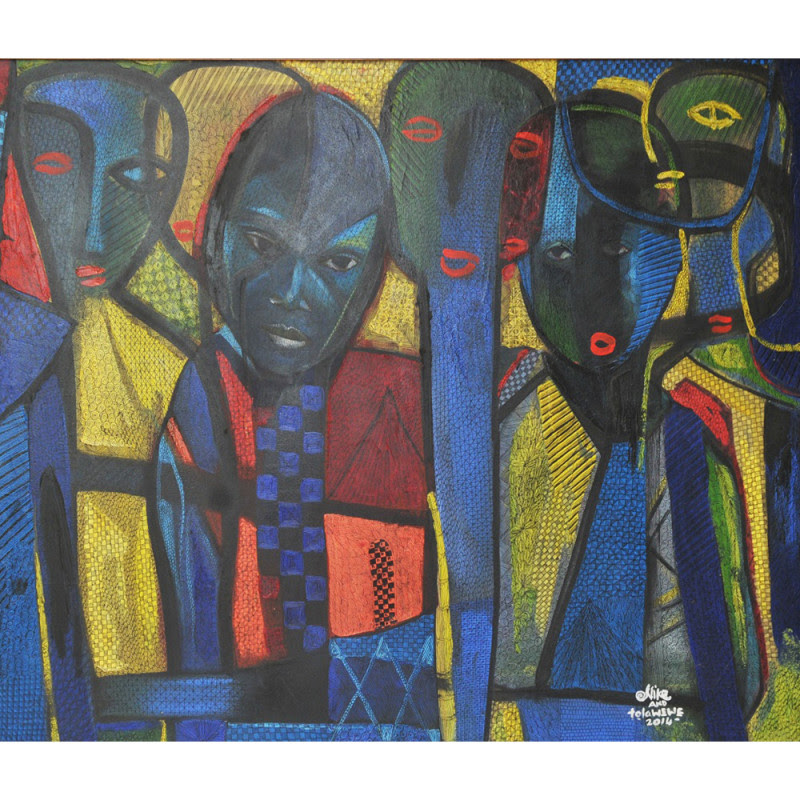
In Their Eyes by Nike Okundaye & Tola Wewe, presented by Nike Art Gallery
Nike Okundaye| Nike Art Gallery
Nike Okundaye is a textile artist, weaver, and embroiderer whose works are inspired by the traditional patterns of Yoruba culture. A renowned social entrepreneur, philanthropist, and advocate of the arts, Okundaye is also the founder of the Nike Art and Culture Foundation, from which emerged Nigeria’s first textile museum and a series of art centers aimed at preserving the country’s textile heritage and training aspiring artists in a variety of disciplines. Okundaye has exhibited and given talks on Nigerian traditional art and design across Europe, Japan, and the U.S.

La Vénus Hottentote! by Roméo Mivekannin, presented by Galerie Cécile Fakhoury
Operating at the crossroads of inherited tradition and the contemporary world, Mivekannin confronts us with the representation of the black body in art and history. In works inspired by photographic archives and iconic paintings emblematic of the history of western art, Mivekannin adds a back and forth between past and present by inlaying his face on some of the represented characters, thereby imbuing each work with its own historical time. Mivekannin trained as an architect before devoting himself to an art practice rooted in art history and sociology.

Dans le Bain II by Claudie Poinsard, presented by Galerie MAM
Claudie Poinsard| Galerie MAM
French-Cameroonian artist Claudie Poinsard’s approach to painting involves consideration of human bodies at the limits of their representation. Her desire: to deconstruct the body to reveal its emptiness. Poinsard seeks to apprehend humanity in the modern world, an endeavor that involves querying the concept of roots, the culture of consumerism, and the cult of beauty, and more recently broaches the subject of existential loneliness. Her work has been showcased in Cameroon, Côte d’Ivoire, Senegal, Denmark, and France, and is in several permanent collections, including Gallery MAM, Douala; the Donwahi Foundation, Abidjan; Galleri Juel Verland Art, Denmark; and Gallery Bartoli, Marseille.
Ghanaian artist Rufai Zakari is an adherent of the recycled art movement. His practice involves using found objects to produce artistic critiques of consumerism, pollution, and industrialization in contemporary Ghana.
Zakari fuses trims and stitches his finds to create figurative collages that mimic traditional painting, reimagining his female subjects as living lives of luxury, in contrast to their actual lives, which he seeks to transform by revealing their inner beauty and vibrancy. Zakari is the founder of the Rujab Eco-Art Foundation, which aims to inspire ecological regeneration through art.

Purification 2 by Sess Essoh presented by LouiSimone Guirandou Gallery
Sess Essoh’s work revolves around themes of history and human societies and seeks to question and restore our collective memory. Essoh’s ongoing search for a means to greater freedom of expression continuously draws him to unusual media, such as chalk on canvas, dark fabrics, gold paint, and blood, which give his work a unique character. Essoh oversees Yes Graffiti, a collective he founded to promote art education for young offenders.
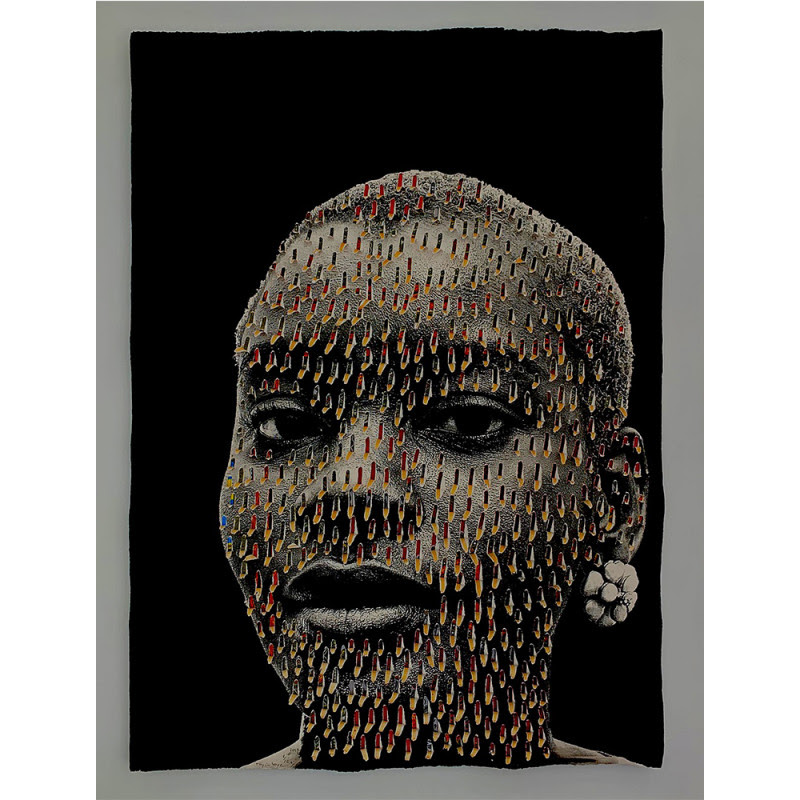
DPosh by Toyin Loye, presented by kó
Toyin is known for his experimentation with diverse media. His works combine photographic elements, often using black and white photographs of women, which he punctures to create rips and tears. Loye points to Yoruba traditions of scarification and facial and body markings, which represent symbols of beauty as well as identification with community, family, and genealogy. By carving into the surface, the artworks take on a sculptural depth and play with abstraction and color. Created through a silkscreen process, each work is unique in its individual perforations.
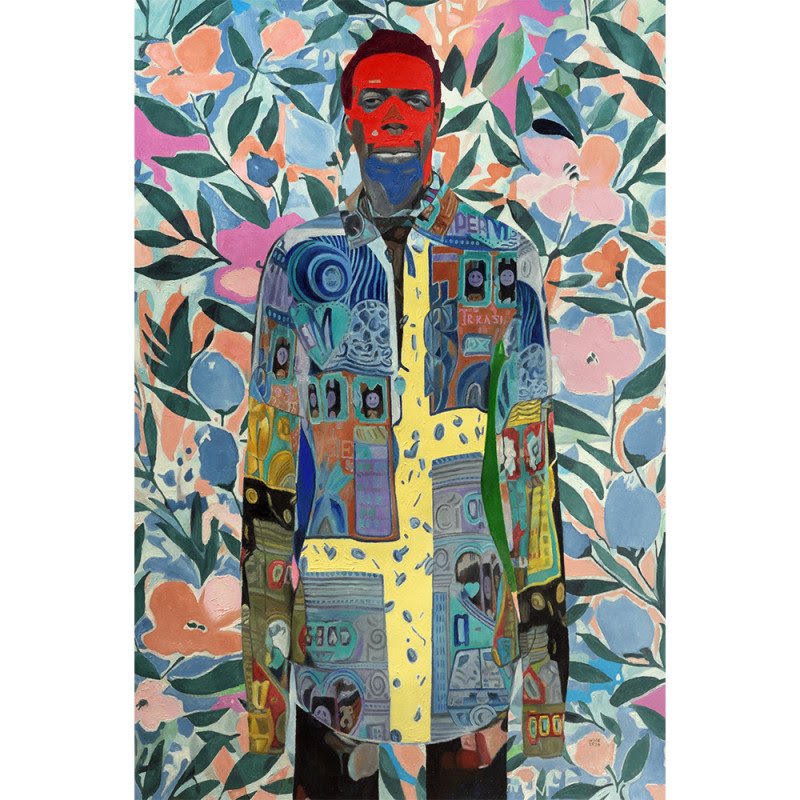
The Wilderness Experience by Wole Lagunju, presented by Ed Cross Fine Art
Wole Lagunju’s work is associated with ‘Onaism’, a contemporary art movement of the Ife Art School dedicated to reimagining the forms and philosophy of traditional Yoruba art and design. In recent years, his work has focused on the forms and traditions of Gelede masks and the juxtaposition of diverse cultural notions exploring post-colonial hierarchies and hybridization. Lagunju’s work has attracted considerable international attention this year, and ART X Lagos 2020 marks his first showing in Nigeria in years.
